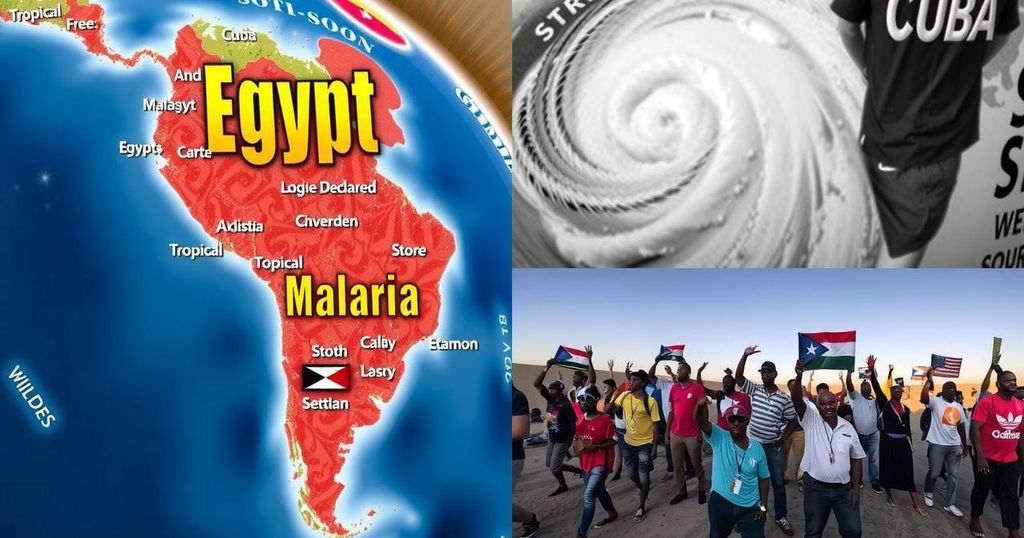Recent global news highlights Egypt’s historic achievement of being declared malaria-free by the WHO, while Cuba faces power outages exacerbated by Tropical Storm Oscar. In Mozambique, political tensions rise following the killings of opposition figures, prompting calls for investigation, and South Sudan experiences severe flooding, requiring significant humanitarian aid from the WHO.
In recent global news, several significant events have emerged, highlighting public health achievements, natural disasters, and political turmoil in various regions. Firstly, Egypt has been officially certified as malaria-free by the World Health Organization (WHO), concluding a historic effort that spans over one hundred years. WHO Director-General Tedros Adhanom-Ghebreyesus hailed this accomplishment, emphasizing that it reflects Egypt’s dedication to eradicating this age-old disease that has coexisted with its civilization. This achievement places Egypt among only three nations in the Eastern Mediterranean to receive such recognition, alongside the United Arab Emirates and Morocco. Yet, as Egypt celebrates this public health milestone, Cuba grapples with the consequences of Tropical Storm Oscar, which has left millions without power. The Cuban power grid has suffered a series of outages, affecting around 10 million residents, a situation exacerbated by infrastructure issues and economic sanctions. The UN has pledged support to Cuba to assist in overcoming the challenges posed by this storm and the resulting power failures. In Mozambique, the situation is markedly different as the UN Secretary-General António Guterres has called for an urgent investigation into the recent killings of two opposition figures amid electoral tensions. The deaths of Elvino Dias and Paulo Guambe highlight the precarious political environment as disputes surrounding the recent election results unfold. Guterres has urged for calm and restraint among the populace, stressing the importance of upholding peace during this tumultuous period. Lastly, the WHO has extended its support to South Sudan, where severe flooding has led to a humanitarian crisis impacting approximately 890,000 individuals. With flooding displacing over 226,000 people and affecting health facilities, WHO’s distribution of emergency medical supplies aims to alleviate the suffering inflicted by this natural disaster, which has been intensified by climate change. This series of events underscores the complexity and multifaceted nature of current global issues that include public health advancements, natural disasters, and the need for political stability.
The articles discuss a range of global issues including public health, environmental challenges, and political conflicts. The certification of Egypt as malaria-free marks a milestone in public health, reflecting successful efforts to eradicate a disease that has affected the nation for centuries. In Cuba, the aftermath of a tropical storm has highlighted vulnerabilities in the nation’s infrastructure, while in Mozambique, political violence raises concerns about stability and governance. Meanwhile, in South Sudan, the WHO’s aid in combating the consequences of severe flooding showcases ongoing humanitarian challenges exacerbated by climate change and regional conflict.
In conclusion, the recent developments across various nations illustrate a spectrum of successes and challenges in health, environment, and politics. Egypt’s malaria-free certification stands as a beacon of hope and dedication to public health, while Cuba’s ongoing struggle with a tropical storm reflects vulnerabilities that can arise from both natural events and systemic issues. Mozambique’s political violence serves as a reminder of the fragility of peace, underscoring the necessity of stability in governance. Finally, the dire humanitarian situation in South Sudan exemplifies the urgent need for international support and action to address the effects of climate change and armed conflict. Together, these events portray a world striving for health improvements and stability amidst adversity.
Original Source: news.un.org






